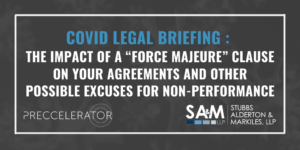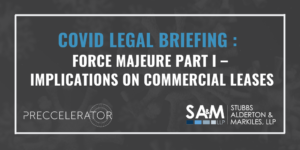 Force Majeure provisions in an agreement may excuse performance by one or both parties to a contract as a result of events that can neither be anticipated nor controlled. These provisions range from simple and boilerplate to extraordinarily detailed. But you may also be excused from performance of a contract if performance of the agreement impossible or impracticable.
Force Majeure provisions in an agreement may excuse performance by one or both parties to a contract as a result of events that can neither be anticipated nor controlled. These provisions range from simple and boilerplate to extraordinarily detailed. But you may also be excused from performance of a contract if performance of the agreement impossible or impracticable.
In the case of the outbreak of the current coronavirus (“COVID-19 Pandemic”), there are several terms or phrases to look for in an agreement, including a Force Majeure provision, when considering whether an event may provide a party with the ability to be excused from performance. However, you must also review the entirety of the applicable agreement to determine if there is any specific exclusion or exception to certain events that do not constitute a Force Majeure or otherwise justify non-performance.
- The most obvious is, whether there is any reference to viruses, particular illnesses, pandemic, plague, etc. For example, an explicit reference to a “virus” or “pandemic” would most likely excuse performance based on the COVID-19 Pandemic. COVID-19’s classification as a “pandemic” by the World Health Organization (“WHO”) will trigger a Force Majeure clause that expressly accounts for “pandemics.” However, the declaration of this event as a pandemic all by itself – without a reference to pandemics in a Force Majeure clause – will not automatically constitute an excuse from performance given the courts’ focus on whether the event is specified within the specific language in the agreement. Clauses that are silent on pandemics, epidemics, or other viral outbreaks are likely to be insufficient for a Force Majeure defense to performance due to COVID-19, unless, of course, courts change the analysis to account for the existing current situation. Further, courts may still evaluate whether measures could have been taken to avoid the consequences of the Force Majeure event or if the actions exacerbated the likelihood of the Force Majeure event causing non-performance.
- In addition to the foregoing, the enactment of substantial governmental regulations, as many local, state, and the federal governments have recently done, including limiting the movement of “non-essential” workers, which could impact the supply chain and physical performance on many contracts, as well as on travel, large gatherings and the like have all resulted in significant business interruptions with significant impact on many businesses. If the applicable Force Majeure provision provides that if inability to perform is the result of governmental orders or regulations which makes performance impossible, businesses may be able to invoke the Force Majeure provision to excuse any contractual obligation to perform resulting from these events. Although if the provision does not include a reference to viruses, illness or the like, it may be more limited, as any non-performance will need to be caused by government action, not the virus or illness alone.
- Finally, “open-ended” or “catch-all” language does not always work to cover a situation not explicitly stated in an agreement. It is most likely that these provisions will only apply to Force Majeure events that were not foreseeable at the time of contracting. Courts are typically reticent to allow broadly worded Force Majeure provisions to excuse performance, and whether an unprecedent outbreak of a virus or disease is something that a court would find to be “foreseeable” will vary by jurisdiction.
California Courts’ Interpretation of Force Majeure Provisions
Foreseeability Standard For “Open-Ended”- Catch-All” Provisions
Reasonable Control Requirement
Interpretation of Force Majeure Provisions in Other States
Force Majeure and the COVID-19 Pandemic
Impossibility or Impracticability of Performance
Authors: Jeffrey Gersh
Celina Kirchner
Crystal Jonelis
Karine Akopchikyan
The attorneys of Stubbs Alderton & Markiles, LLP are continuously monitoring the current COVID-19 situation and publishing relevant updates that pertain to your business. Contact one of our legal professionals at info@stubbsalderton.com, if you have any questions.
For more information please visit our COVID-19 Resources page.

 With the COVID-19 pandemic raging, businesses are concerned about whether this event will excuse their performance of agreements they entered into prior to the pandemic, and with the beginning of a new month fast approaching whether to pay the rent on their leases, while landlords are engaged in the same thought process of wondering if the rent checks are going to timely arrive. That dilemma is especially acute in places like California, with Governor Newsom’s stay-at-home order made on March 19 and its impact on all businesses and the rapidly emptying commercial and non-essential retail space.
With the COVID-19 pandemic raging, businesses are concerned about whether this event will excuse their performance of agreements they entered into prior to the pandemic, and with the beginning of a new month fast approaching whether to pay the rent on their leases, while landlords are engaged in the same thought process of wondering if the rent checks are going to timely arrive. That dilemma is especially acute in places like California, with Governor Newsom’s stay-at-home order made on March 19 and its impact on all businesses and the rapidly emptying commercial and non-essential retail space.